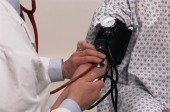- Could Your Grocery Store Meat Be Causing Recurring UTIs?
- Are You Making This Expensive Thermostat Error This Winter?
- Recognizing the Signs of Hypothyroidism
- 10 Strategies to Overcome Insomnia
- Could Artificial Sweeteners Be Aging the Brain Faster?
- Techniques for Soothing Your Nervous System
- Does the Water in Your House Smell Funny? Here’s Why
- Can a Daily Dose of Apple Cider Vinegar Actually Aid Weight Loss?
- 6 Health Beverages That Can Actually Spike Your Blood Sugar
- Treatment Options for Social Anxiety Disorder
More Cases of High Blood Pressure in Less Affluent States


Your odds of suffering from high blood pressure may rise depending on the state you live in, a new study suggests.
Researchers at the U.S. Centers for Disease Control and Prevention report that people living in low-income states are more likely to have the ailment, compared to those living in more affluent states.
The study “suggests that hypertension risk may be influenced by societal structures, institutions, norms and policies” in various locales, according to the team led by Amy Fan, of the CDC’s National Center for Chronic Disease Prevention and Health Promotion.
Their analysis of 2011 data found that states with an average household income of about $43,000 or less, and states where nearly a fifth or more residents live below the poverty line, have higher rates of high blood pressure than wealthier states.
The overall rate of high blood pressure in the United States was about 33 percent, the study found. However, rates for individual states varied widely — from about 24 percent in Utah to nearly 41 percent in Alaska.
In low-income states, women and adults who were unable to work appeared to be at greatest risk for high blood pressure, according to the study published Feb. 26 in the CDC journal Preventing Chronic Disease.
“Prevention and control of hypertension are key elements in CDC’s state program for chronic disease prevention,” Fan and her colleagues wrote.
More information
The American Academy of Family Physicians has more about high blood pressure.
Source: HealthDay
Copyright © 2026 HealthDay. All rights reserved.










